#heroes return era
Text
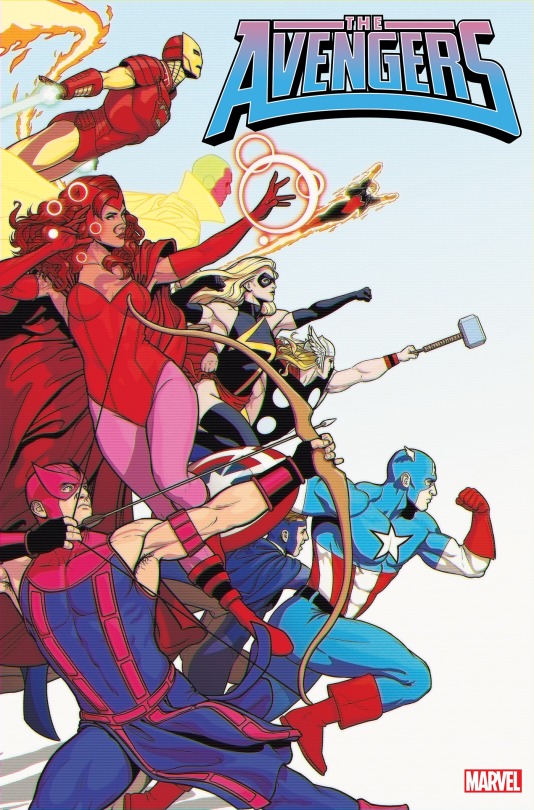
Avengers Vol.9 #10 '97 variant cover by Jamie McKelvie (2024).
#the avengers#earth's mightiest heroes#marvel#avengers assemble#kurt busiek#george perez#late 90s#heroes return era#nostalgia#thor#iron man#captain america#hawkeye#justice#firestar#warbird#vision#scarlet witch#1997#roster#iconic#tom brevoort#marvel comics
11 notes
·
View notes
Text
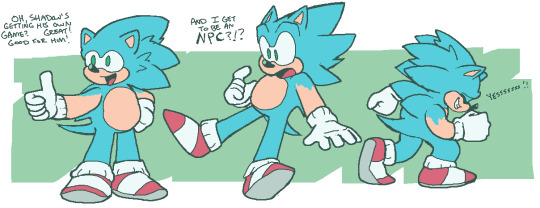
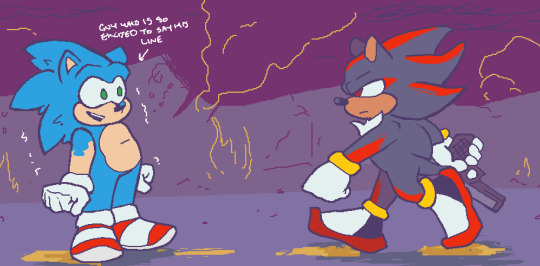
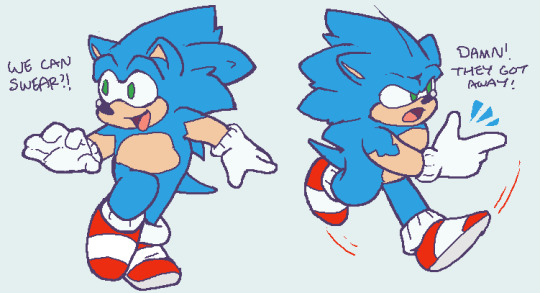
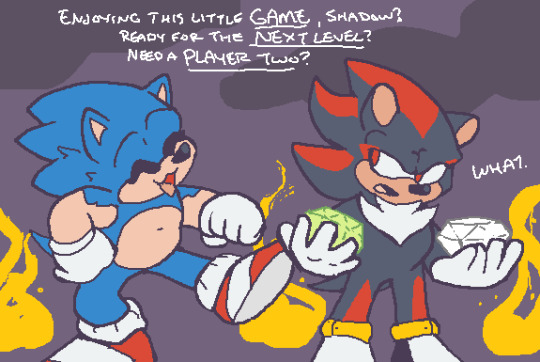
I think sonic had a really good time not being playable for once and just being supporting cast for his friend shadow. i just know he was soooo excited to explain the controls and not worry about rings and cheer on his friend (and sometimes be a final boss :3)
#sth#shth#sonic the hedgehog#shadow the hedgehog#sonic the character#fanart#id in alt text#i have. another batch of shadow (game) drawings after this#bc im having a really good time with it#it is definitely somewhere in the top 3 sonic games for me. it's good! and anyone who says otherwise just hates fun#sonic in this game soooo funny he IS so annoying but it is so cute truly#im really bad at the hero mission in space gadget but sonics dialogue is sooooo cute in that..#he's just having fun racing with his friend again 🥺#shadow is having the most intense and miserable experience of his short life and sonic is just like yaayayayay video game yaaay!#anyway. return of my adventure-era sonic design. even tho shth canonically takes place A While after sa2#whatever. they r the same to me
2K notes
·
View notes
Text
JAWAN TRAILER HAS F*CKING DROPPED I REPEAT JAWAN TRAILER HAS F*CKING DROPPED
#film: jawan#jawan#shah rukh khan#srk#vijay sethupathi#nayanthara#sanya malhotra#priyamani#bollywood#local gay watches Bollywood.txt#'main kaun hoon' bitch—#in between the screaming about KTL i got the notif from YouTube and ran#it's a dual role i saw a Don-esque look nearly bit my tongue from screaming Deepika's in a cameo there's a girl squad#that reminded me almost immediately of Chak De! India holy f*ck#did i mention the Don-esque look also has a POTO thing going bc i don't think i did#'when i become a villain no hero stands a chance against me' SRK VILLAIN ERA RETURNS CAN I HEAR A F*CKING AMEN#we are getting bald!SRK in one of those dual roles tho. don't know whether to be terrified or turned tf on#both. both is good
31 notes
·
View notes
Text
So Return of Ultraman is pretty solid and I like Goh as a protagonist, but goddamn he will just slap anyone huh
#return of ultraman#ultraman jack#hideki go#ultraman#like it really does do a decent job making the show engaging#when other showa era toku shows just did whatever the fuck until the episode ended#but it's really hard to swallow how often showa heroes just slap people
7 notes
·
View notes
Text
god give me the strength to ignore the urge to rewatch MHA now that it's on Netflix.........I can't do that again........
#jaytp#joking aside i still love my hero even tho i havent watched or read in years#but idk if im ready to return to that era of my life lol
0 notes
Text
The red empress/Not-Joanelle-One, was a newly born daedra made of pure human vanity/greed/envy that went around piloting Joanelle's visibly rotting corpse and rearranging the isles to her aesthetic satisfaction for two and a half decades.
Joanelle-of-Cylarne is that same daedra, but successfully split from the rest of Sheogorath. Refined, in a way. She's a daedric copy of Joanelle, which means she's basically Joanelle just with all the bad parts exaggerated by Sheogorath's memories.
#hero of kvatch#Shivering isles#Relmyna spent the entirety of the red empress era hidden in her lab waiting for Sheogorath's return#She was JAZZED when he told her that Joanelle's punishment for bad ruler crimes would be 25 years in Xaselm#Less jazzed when she cut Joanelle-of-Cylarne open and found the heart of a daedra
0 notes
Text
I'm haunted by the beautiful potential in an Edwardian-era Persuasion.
A setting just after WWI, another time of major social upheaval--blurring class barriers, new ideas about gender roles, further crumbling of the aristocracy
Sir Walter blindly clings to the old order, barely thinking about the war except to lament the impossibility of getting good servants these days
Elizabeth Elliot styles herself as a bit of a women's rights activist, claiming this is the reason she remains unmarried
Anne would have served as a nurse if her father had allowed it, but of course he couldn't permit an Elliot of the Elliots to undertake such ugly work, so she stayed at home quietly undertaking the usual home-front charitable work
This war deepens the story's melancholy. There's not the same sense of the men returning home as conquering heroes. The world is changing, but is it worth what we've lost? Can we have hope for the future when all our optimistic dreams led to such slaughter?
The best way to retain some of Wentworth's glamour is to make him a flyboy. However, given their short life expectancies, I'm not sure how realistic it is to have him and several buddies survive the war.
A "band of brothers" in the trenches is also a decent analogue for their relationship
Harville's injury meant he was invalided home fairly early. Benwick's probably a wartime poet suffering from shell shock that only got worse after his fiance died in the influenza epidemic.
Louisa and Henrietta are of a slightly younger generation that hasn't been quite as scarred by the war. Their relative innocence makes them refreshing to a war-weary returning soldier
It's possible Wentworth is so shaken by Louisa's accident (and thus needs Anne to take charge) because it sparks some kind of PTSD flashback. (Though that may not be the best direction to take the character).
There's just so much potential to explore the layers--old wounds and new possibilities, finding ways to heal and grow and rebuild after pain and loss
436 notes
·
View notes
Text
a lot of things we never thought would happen have happened in a specific set of subcultures lately and I'm not sure what to make of it (I'll leave out cultural speculation/analysis here today because I have no big brain thoughts atm, feel free to add your own though)
my chemical romance reunited
fall out boy has entered a new era, complete w/ folie appreciation
gym class heroes is back
cobra starship is back
mikey way on stage with fall out boy
the academy is... on tour with fall out boy
dan and phil games full return with regular uploads
david tennant is the doctor again
og smosh is back
blink-182 w/ tom delonge and touring again
mcr and fob headlining a festival together
mcr and fob touring together is a possibility
I'll add to this as I think of things but do you see what I mean? five years ago this all seemed literally impossible. tumblr jokes. memes. absolutely unfathomable, something too good to be true in all cases. it's like my middle school self is being handed a gift basket of everything I've ever been too skeptical to ask for
#fall out boy#fob#pete wentz#patrick stump#joe trohman#andy hurley#mcr#my chemical romance#dan and phil#dnp#mikey way#tai...#cobra starship#gym class heroes#gch
731 notes
·
View notes
Text
I have a small theory as to why the bulblins kidnaped the kids in Ordon while Link got left behind. Time states that Ganondorf has become afraid of children in Heroes legacy. Ganon became paranoid after his encounter with the Hero of Time.
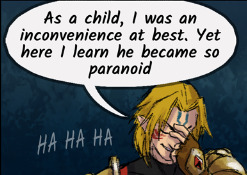

SO back to the era of Twilight Princess. The Hero of Time has a descendant. The Hero of Time has a bloodline and Ganondorf is a ruthless man. In this vision/flashback, we see Ganon doing his evil deeds before he is banished to the Twilight realm. I think this is showcasing us that Gannon caused the ruins in tp looking for baby Twilight.
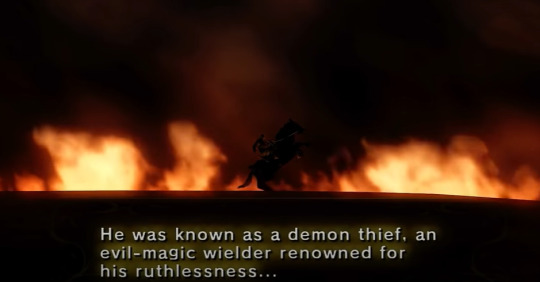
I think that this war was the start of the resistance group. The members of the resistance look for and take care of any survivors. This is where Rusl finds little link. Rusl takes the child to Ordon and raises the boy with his wife Uli. Ordon is an isolated village.
The Twilight realm is a perpetual twilight, Ganondorf would be unable to tell how much time has passed, or at least have a difficult time doing so. Until he is in the realm of light again.
I think at the beginning of his return is unaware that baby Link is now a young adult. So he sends his henchmen to find and capture children expecting to find a young link eventually. (wind waker style-ish) thus the children in Ordon are kidnapped.
oh dear remember when I said this was a small theory.
NOW I am aware that I said that Ganondorf was unaware for a little bit that little link grew up. I have a reason, it's Collin. don't tell me he wouldn't get mistaken for a young link. The blond hair color, the way his hair is parted down the middle? blue eyes? why such a display unless you're going to parade the poor kid all the way to Ganondorf. As a way to say i found the kid you were lookin for.
we the players know that Colin has round ears but it's also interesting that out of all the village kids, Colin's ears are obscured by his hair on both sides. (clarifying that the design choice that we easily see the round ear tops of the other village kids intrigues me)


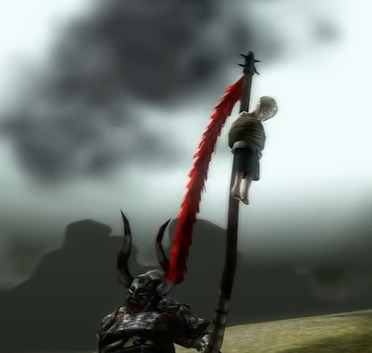
#i have a theory#will anyone let me know if my thought holds any water or not?#soooo#linked universe#lu twilight#loz#lu time#lu chain#lu#twilight princess#ordon#ordon kids#loz theory#lu theory#ocarina of time#rusl#Rusl#uli#ganondorf
222 notes
·
View notes
Text
Clematis - Anthony Bridgerton x Reader
Clematis (Clematis) - Meaning: Ingenuity, cleverness
Summary: Anthony's lover comes up with a way to see him after the ball.
Pairing: Anthony Bridgerton x Reader
Word Count: 1504
Warnings: SMUT, probably poorly written cunnilingus (F receiving), reader has female anatomy, Regency era gender politics, Anthony loves giving head
Day 15 and not sure how I feel about this one. Getting it in under the wire, it's almost midnight where I'm at. I just want a man to come in through my window and eat my 😼 okay???
In Bloom Masterlist
Likes, Comments, Reblogs are ALWAYS appreciated! ❤️
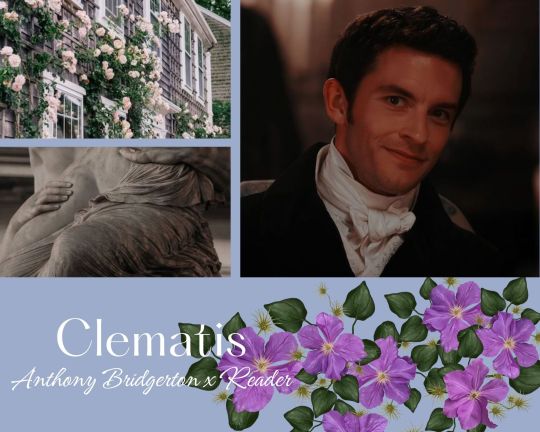
If this was how Anthony Bridgerton kissed, you couldn’t imagine how else he could make you feel. His lips were firm against yours, but gentle, coaxing, his large hands tracing down your neck and along the line of your decollete which made your breath hitch.
Part of the intoxication was the danger of the situation — you were the daughter of an Earl, a respectable lady of the Ton, and if you were discovered with Anthony Bridgerton’s hands and lips all over you, you would be ruined.
You broke the kiss, needing an influx of air or you would surely faint. Anthony rested his forehead against yours.
“I need you,” you breathed out, “Anthony, I need you.”
He ran a delicate finger down your chest, “Not here, dearest.”
“Then where? When?” You couldn’t help the whine that escaped you as you pressed your pliant body against his firm one.
He sighed, dropping his forehead to your shoulder. “If only I could whisk you away from here without drawing suspicion.”
An idea came to mind — it was risky, but if he agreed you could continue feeling like you were on fire, and oh, how you wanted to burn.
“Come to my home, tonight,” you whispered, gasping a little as his lips pressed against your neck, licking over your jeweled necklace. “There’s a trellis just under my window, you can climb right up.”
“You wish for me to defile you in your own bedroom?” Anthony growled against your neck, “Naughty girl.”
He agreed to the plan nonetheless, and you straightened yourself before heading back to your parents, claiming a headache and asking for the carriage.
“But dear, you haven’t danced with Lord Hollingsworth yet!” your Mama declared, having selected the oh-so-boring yet oh-so-available man as your best hope for marriage at the beginning of the season.
“Now, now Cecelia,” your Papa chimed in, “if the girl is unwell we shan’t force her to dance. I’ll call the carriage, dears, you two gather your things and say your goodbyes.” He nodded at you and ducked away, eager to get home as usual.
From across the ballroom, you caught Anthony’s eye and nodded slightly. He winked, sending the butterflies in your stomach into a frenzy. He was to give you ninety minutes to make sure your parents were asleep, then scale your trellis like a hero in a romantic novel.
Immediately upon your return home, you excused yourself upstairs. Your maid helped you undress, but you dismissed her quickly, claiming you could handle taking the pins out of your hair on your own. Over the next hour, you listened as your father retired to his study and your mother to her bedroom.
Once you were sure your parents were in for the night, you placed a candle in your window — his signal that the coast was clear. Unable to remain still, you started pacing your room. Would he show up or leave you twisting in the wind like this?
Only a few minutes of pacing later a knock came from your window. You dashed over, unlatching it and moving the candle for Anthony to pull himself up. He did so athletically, like letting a tiger into your bedroom. When he was inside, you closed the window and he was on you in a heartbeat, hot kisses along the back of your neck while his hands slid around your waist.
Your hand came up to grip the back of his head, your fingers lacing through his silken hair. You pressed back against him, turning your head to meet his lips with your own. He tasted like whiskey and sin. He spun you around in his grasp and tugged you close to him by your hips.
You gasped as you felt his cock pressing into your lower tummy — he was large. For a moment you hesitated, wondering how something so large would fit inside you, but Anthony’s insistent grip on your hips turned into him grabbing handfuls of your nightgown and pulling the cool silk up, up, up.
“You came,” you gasped breathlessly.
“You didn’t think I would? Tsk, tsk,” he joked, clicking his tongue at you. “My dear, now that I’ve had a taste, I cannot get enough.”
He emphasized his point by kissing your lips once again, licking his tongue into your mouth. You responded with a soft moan, which only seemed to spur him on.
Before you knew what was happening, Anthony had tossed you back onto your bed and was crawling over you, bringing the hem of your nightgown with him. Your breath hitched as you felt his warm, large fingers tracing trails of fire up your legs, teasing your wetness through your undergarments.
“May I taste you,” he asked, and you moaned your response which prompted him to stop his fingers only an inch from where you needed him most. Opening your eyes, you looked down at him and whined. He rose to meet your lips with his. “I need you to remain quiet, otherwise I will stop. And we don’t want that, sweet one, do we?”
Anything. Anything he wanted as long as he kept touching you. When he saw you nod, he hooked a finger beneath your gusset and ripped it, baring your wetness to him. With eyes dark as obsidian in the light of the single candle burning, he gazed up at you with such heat as you had never known.
He hooked one of your legs over his shoulder, then licked a long stripe into you, sending a lightning bolt up your spine. His lips curled around your clit and you shuddered. A moan threatened to slip past your lips but you clamped your hand over your mouth to stop it. The noise was caught in your throat, fluttering like a canary in a cage.
Anthony hummed a, “good girl,” against you, making you clench around nothing.
You moved your hands, making an effort to keep your tone low, “More, please!”
You felt him smirk against you before he redoubled his efforts, this time breaching your entrance with a thick finger. Moaning at the intrusion, Anthony took this as an invitation to add another finger, stretching you deliciously.
You were close, so close, his fingers pumping and hitting a spot within you that you couldn’t reach, his tongue flicking against your clit. Each movement made the knot in your lower tummy tighten, threatening to snap at any moment.
“Anthony, please,” you whined, unable to control your volume.
He slowed his fingers and removed his mouth from you. “Quiet,” he hissed, “Or do you wish for your parents to find me here?”
Unconsciously, you clenched around his fingers. The danger of being caught added something you couldn’t name to the situation. Anthony smiled. “Mmm, does my sweet want to get caught?” He teased, and you clenched again, “I think she does. Such a wanton little strumpet, tempting me into a dark corner to kiss me, then inviting me to her bedchambers in the middle of the night, and squeezing my fingers at the thought of someone coming in…”
His words, said in his tantalizing baritone, were pushing you closer and closer to the edge. If only he would put his mouth to better use and—
As if reading your mind, his lips landed back on your clit and his fingers picked up their pace once more, again finding the spot within you that made you see stars with every pass.
You clamped your hands over your mouth again and moaned his name, which only spurred him on. He drove into you, his tongue and lips reciting an ode against you, dedicating it to you and your pleasure. Having the entire focus of this season’s most eligible bachelor was intoxicating to say the least — and inevitably what pushed you straight into your climax.
You writhed against him, held in place by his strong forearm as he worked you through your orgasm, the aftershocks lasting much longer than they normally did. Anthony remained between your legs and cleaned up every drop of your release before withdrawing.
The clock in the hall chimed thrice. Anthony joined you when you reached for him, kissing you deeply and letting you taste yourself on his tongue. You let your hand drift to the front of his trousers, palming his length until he guided your wrist away.
“As much as I wish for it, I have an early appointment and must be on my way.”
You pouted up at him, but he placed a sweet kiss to your forehead before slipping off the end of your bed with a promise to see you again soon.
You watched as he made his way back down the trellis. When he got to the bottom, he blew you a kiss before disappearing into the dark Mayfair night.
The early appointment Anthony had, you would find out later, was to meet with your father. He asked for your hand that afternoon. And, knowing what awaited you in your marital bed, you happily said yes.
#writing challenge#in bloom#fanfiction#bridgerton#bridgerton fic#bridgerton fanfiction#anthony bridgerton#anthony bridgerton x you#anthony bridgerton x reader#smut#bridgerton smut#anthony bridgerton smut
229 notes
·
View notes
Text
The Same Shade Of Red

Sebastian Vettel x Fem!Reader
Warnings: monza 2020 (double dnf for the boys in red), so much angst sorry, redbull comparisons for seb, the magic that is monza, the disaster that is ferrari and their team, talks of seb's races in monza, a few harsh/sad thoughts from seb, mentions of retirement, charles's crash in monza 2020, mentions of the pandemic, reader is the most loving wife to which seb is her perfect match, britta is sooo over you guys after years of this.
Word Count: 2.2k
Author's Note: would I be me if I didn't take monza race weekend and turn it into an ode to seb? no. ferrari seb you will always be my most beloved and fuck you ferrari for hurting my husband fr. (also this gif is so sexy I can't explain it. well I can but I will be banned from tumblr dot com)
---
Monza held a special place in the heart of your husband, in yours and in anyone that was a part of the Vettel family.
Sebastian had proven his worth, winning his and Toro Rosso's first ever Grand Prix in Monza during the 2008 season.
It was no different when he moved to Red Bull from Toro Rosso, his era of dominance brought him win after win and two of which were in Monza; the home of Ferrari.
Ever since that first win, Sebastian held a special love for Monza, as did you. There's something magical about the place; it might be the atmosphere or the fans but it has always been good to you and Seb. Whatever it was, it was nothing if not remarkable every single time.
The Tifosi held their drivers to the highest of standards, some would say next to God. Something happens to Italy when motorsport comes to town; everything changes and every single person you meet is so passionate. They live and breathe for Ferrari, they'd die for their drivers if it meant they could see them on that top step.
When Sebastian moved from Red Bull to Ferrari, he counted down the days to Monza.
It had always been his dream to drive with the red team, just as his childhood hero and friend, Michael, had done. Sebastian's first year with Ferrari was the epitome of picture perfect.
Despite coming in P2 behind Lewis and Mercedes, being on the podium at home for Ferrari meant everything to the German driver. This wasn't the first time he had gotten on podium for Ferrari, in fact he had already won twice with them that season; in Malaysia and then again in Hungary.
Monza was different; magical, special. There was something in the air, the energy was indescribable. Sebastian grinned, waving to the team from the second step.
You smiled, watching as your fiancé at the time hummed along to the Italian anthem, a country he quickly counted as his second home.
Sebastian was the king of the world that day, even though he hadn't won.
He had returned to the garage with the biggest grin on his face, trophy in one hand and the bottle of champagne in the other. He passed them over to his engineer, making a beeline for you. The man's covered in champagne and sweat and confetti, and he smells like gasoline and engine oil but he picks you up, squeezing you tightly.
You remember telling him how much you loved him and how proud of him you were. Sebastian responded with a kiss, you can taste the champagne; a familiar taste that slowly became more scarce as his days with Ferrari went on.
Unfortunately, things took a bit of a downwards dip for Sebastian after that. He was hungry to win, he was constantly in a fight for the championship every year and it was killing him that he wasn't there yet. Yes, he had won races with them and broken every record he could possibly break but if he couldn't achieve the one thing he really set out to do, the one thing he had always dreamt about, then what was the point?
Monza seemed to always have Sebastian in its grasp, tricking him as the years went on. He almost always was there, he could reach out and touch the win and yet, it slipped through his fingers. Winning in Monza meant more to a Ferrari driver than winning in Monaco would - unless you were born and raised there like Sebastian's teammate, Charles.
You were the king of the world if you won there; your name written in the history books from now until the end of time.
Sebastian longed for his name to be in the book of the greats; Sebastian Vettel, Monza race winner.
A dream that slipped through his fingers as did his hope of winning the championship with Ferrari.
After coming in P2 in 2015, things just kept getting further and further from the finish line for him. P3 in 2016 and 2017, P4 in 2018 and last year was the final shove before the cherry on top this year; P13 while his new teammate, Charles, stood on the top step as race winner, basking in the magic that is Monza.
He was happy for him, beyond happy actually and any win for the team was great but oh how he wished that was him.
Now you're back in Monza, the season had been delayed due to the pandemic and this was the first race you had been able to join him for all season. It was weird being there with the track empty; just the teams and the occasional celebrity guest that was rich enough to pay their way in.
The car has been giving Sebastian a hard time all weekend, practice was shit and he placed P17 in qualifying. It wasn't a good weekend for your husband.
"Be good," you told him while he was getting ready for the race. Sebastian nods, a witty remark about him always being a good boy slipped past his lips and you waved him off, your cheeks red as you walked back to the garage.
Watching him start from the back of the grid was breaking your heart, you knew he could manage much more than that but it's the stupid car that was giving him trouble.
He barely got a grip on the car before he drove off and into the blocks that were in the run off area. Your brows furrowed as you watched him speed through the blocks, his voice coming through the headphone - "brakes failed."
Your heart drops, eyes fixed on the screen as Seb pulls the car into the corner as best as he can without disrupting the race. He finds his way back to the garage after the marshals come for his car, Sebastian gives your hand a squeeze as he passes through and into the back hallway to his driver's room. You figured you'd give him space to cool off and you stayed in the garage to watch a bit more of the race.
It was barely 20 laps later that you saw the other Ferrari slide into the wall. To no fault of Charles, the car had understeer which caused him to lose the back half and send him into the wall. You stood there, waiting to hear if Charles spoke before you took your headphones off.
Once you hear that he's okay, you step out of the garage and make your way to your husband's driver room. You knock on the door, peeking in before he answers.
Sebastian gives you a sad smile, you can feel your heart breaking as you step in and shut the door behind you. He's sitting on the bench and you walk over, joining him.
"Charles is coming in."
"What? The race isn't over, is it?" Sebastian looks over at you before glancing out the window. You shook your head, "it's a red flag now, Charles' car has understeer, went into the wall."
"Is he okay?" He asks and you nod, "he's a little shaken up but he'll be okay."
Your hand finds your husband's, interlocking fingers. "I always admire that even when you're going through it, you still look out for others."
"I know what it's like to be in his position, it's tough."
You hum, glancing down at the racing boots that were tossed to the side, Seb's sock clad feet slide back and forth over the floor. "You know what happened today wasn't your fault, Sebastian. It was mechanical."
He's quiet for a bit, nodding at your words. "I don't know how much more of this I can take, baby."
You look over at the man, "of Ferrari or of racing?"
"Both," he answers truthfully.
Sebastian and Ferrari had come to a mutual agreement - a publicity term - that they would not be renewing his contract. You weren't opposed to it, you knew it was killing your husband to go but if Sebastian was good at one thing, it was that he knew when it was time to go, he had to go. He wanted to win with them, you think a part of him still held a tiny sliver of hope that he would find his way back to the top step as champion of the world but he also knew being there was killing him.
Mentally, physically, emotionally; he couldn't bear the pressure of staying there any longer.
"It's just a few more races, love. You can do it."
He nods, "I know but.." "Don't even go there," you tell him, shifting to face him. One of your legs hanging off the bench as the other folded in front of you.
"Monza's special, you know that." He says, "I just.. I feel like I failed." He sighs, his head hung and if your heart wasn't already broken, it was broken now.
It was days like today that made you hate the team that your husband so dearly loved.
"You didn't fail, you never failed them, Sebastian." You squeezed his hand, the man looked up at you. Your free hand comes up to cup his jaw, your thumb rubbing over the few days old stubble on his cheek. "If anything, they failed you."
"You have the talent and the skill, and the drive to win and to be a champion; it's them, babe. They couldn't give you a car that was worthy of you, you can't blame yourself for that." You look at your husband and the man sighs again.
"I should have been able to, though. Been able to get the best out of the car."
You scoffed, rolling your eyes. "Seb, c'mon. Be for real right now, it's their shitty ass car, it's not your fault. You know Lewis's car is basically a rocket ship, plus it's not like your strategies are A1 over here."
Seb tosses you a glance, a look of disapproval on his face. "You're so not helping right now, darling."
You raise your hands in surrender and your husband smiles - his first genuine smile all weekend. You smile back, holding his face again. "I love you, Sebastian."
"I know," he grins and you shake your head, laughing. "This is usually the point where you say I love you back."
"Oh, sorry." he chuckled, "I love you, y/n."
You smile, leaning in to give him a kiss. "Good, now come on. You need to get dressed, go check on your teammate," you patted his thigh, getting up to find a shirt for the man. In the meantime, Seb pulled off his race suit and fire proofs, slipping on a pair of shorts.
"Do I really have to go?" He sits on the bench again, shifting to lay down, his arms tucked behind his head. You roll your eyes, looking through the small cabinet off to the side. "Yes, you know they'll make you out to be a villain if you don't."
"And if I wanna be a villain ?" He asks, looking over at you.
You sigh, tossing the shirt at him, "Sebastian, don't start with me right now."
The man laughs, dropping the shirt on the bench before standing up. Sebastian grabs your hand, pulling you flush against his chest. "Ew," you fake a gag, "you're sweaty."
He smiles, ignoring your comment. "I don't know what I'd do without you, I can't thank you enough for being here for me all these years."
Your hand rests on his jaw, giving him a kiss before smiling at him. "You don't need to thank me, I would do it all over again in a heartbeat but.. if you do wanna thank me, you can buy that purse I liked."
"Show me when we get back, you can take my card and order it."
"I was joking," you look at him, and Seb shrugs. "It's the least I can do to thank you for being the perfect wife."
"It's easy to do when I have the perfect husband," you smile, kissing him again. There's a knock on the door, causing you both to look in the direction of it.
"When the two of you are done being perfect, you're needed for press, Sebastian." Britt's voice from the other side of the door, making you both laugh.
Seb gives you one last kiss before grabbing his shirt, "I'm coming!" He calls to her, pulling it on. He was on his way out but you stopped him, grabbing his hand.
He turns back, looking at you as he waits to see what you wanted. "I'm proud of you, no matter what," you tell him.
Seb nods, smiling at you. "I love you."
---
taglist: @dragon-of-winterfell @benedictscanvas @elisaa-shelby @hnmaga-blog @czechoslovakiandisco @dr3lover @troybolton14 @Lovingroscoee @compulsiveshit @somanyfandomsbruh @damnyoulifee @barzysreputation @vickyofalltrades @yeolsbubbles @barzysreputation @thybulleric @valkyrie418 @ricsaigaslec @idkiwantchocolatee @sessgjarg @molliemoo3 @bisexual-desi @sunf1owerrq @alwaysclassyeagle @coldmuffinbanditshoe @sillybananamaker and @oconso cause she was fucking with the preview I sent her
#sebastian vettel#sebastian vettel x reader#sebastian vettel x you#sebastian vettel imagine#sebastian vettel fanfic#sebastian vettel fluff#sebastian vettel one shot#f1#f1 x reader#f1 x you#f1 x y/n#f1 x female reader#f1 fanfic#f1 fic#f1 fluff#f1 imagine#f1 one shot#formula one#formula one x reader#formula one x you#formula one x y/n#formula one fanfiction#formula one fic
600 notes
·
View notes
Note
odd question: did the norse people ever worship or venerate the warriors of Valhalla? or was it just a goal to aspire to?
The Old Norse people worshipped their ancestors, some of which went to Valhalla, and some who were definitely heroes. But I don't think they worshipped "the warriors of Valhalla" as an archetype, or as paragons to emulate. Valhalla wasn't even viewed as a goal to aspire to. Rather, it was a consolation prize for dying far from home.
Prior to the Viking Age, the Norse people believed they rejoined their family and ancestors after they died. However, this was dependent on the fact they would be buried in the family grave or barrow.
But going a-viking meant risking death far from home, and this death would most likely happen while out at sea or during a skirmish.
In order to reconcile the question of "Where do we go if we can't be with our families?", the Norse people concluded that if they died out at sea, they went to Njord's hall, and if they died in a skirmish, they went to Odin's or Freyja's hall. This way, they had the comfort of knowing they would still be with their gods and people if they perished far from home.
It's important to keep in mind that the vikings were not exactly a warrior class; as in, "being a warrior" wasn't their job. They were pirates. And like all pirates, their goal was to retrieve goods, either by trade or by raid. Most vikings had every intention of making it home alive, and just like being a skilled sailor improved these odds, so did knowing how to put an axe through a man's skull.
Dying while going a-viking was honorable for the same reason that successfully returning home with goods was honorable; it's the fact that a person risked their life to travel very far away and gather resources for their family and community. It's an honorable deed.
But just because this death was honor-worthy doesn't mean it was a goal.
First of all, let's consider the practical aspect here: In a pre-industrial era, no one in their right mind would waste an entire ship on a crew that didn't plan to come back in it.
Secondly, "dying gloriously on the battlefield" only has widespread cultural importance in imperial nations; nations motivated by dominion, conquest, and establishing their widespread rule. Not only were the Norse societies not imperial, they didn't even have a centralized military, let alone the manpower to fight the rank-and-file wars we associate with the term "war."
So I guess the short answer to your question is "neither." Heroes were definitely venerated, but the notion that becoming ulfhednar makes someone the worthiest of all worthies is a retroactive interpretation.
342 notes
·
View notes
Text
Another day another LU analysis with me!
Dawn 9 is here and with it the end of the next arc of the LU comic is done!
This update did a lot and is also a full 10 pages long! So there's a bunch to unpack!
As always linked universe belongs to @linkeduniverse and Jojo, I own none of the pictures I'm using and please give the original post some love. It's very well done and I love this comic so much.
You can find the comic here!
Oh, and obviously spoilers for the most recent LU update if you've not looked at it!
Now, checklist. Popcorn, water and time to read half an hour worth of rambling.
Without further ado!
The letters!
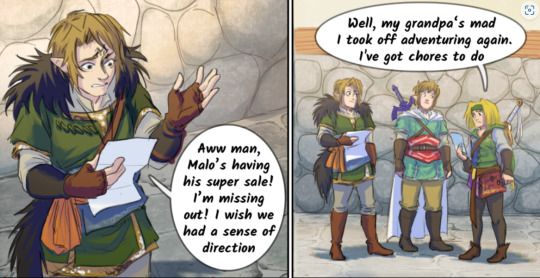
So, Twilight, four and Time all appeared to get letters, with Time getting multiple (More on that later)
Twilights reaction to the super sale was my reaction while playing TP (I recently finished it for the first time! :D) when they opend the store in castle town. Every time i couldnt get there to get potions i was low key gutted.
And Four. Four's grandpa is a mood and i hope we get to meet him.

HE
blorbo blorbo blorbo
The master of standing 🧍
Beloved blorbo i love him
Okay im done
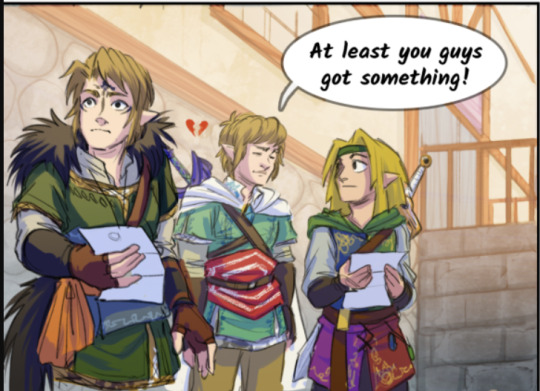
(Im not done)
Poor Sky He's so sad about it D:
But... I, as a part of the The team is heading to Skyloft next, team. Believe that Sun has done this on purpose. (Or that the Skyloftians dont have the mail system for him to retrieve anything) but i like to think its the first one.
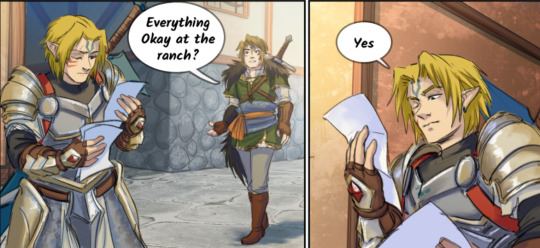
Hmmm.... Time got multiple letters. (That takes care of the letter discrepancy)
Twi asking about the ranch, Time looking to one of the letters. This tells me one of two things.
The letter he's looking to could be from Malon, and he's genuenly not concerned.
or The letter he's looking at isnt from malon. Infact, by the way he's looking at it i think its from his Zelda. Possibly a report about black bloods in his time period. (As last time we see them in Time's era. They dont actually fight anything)
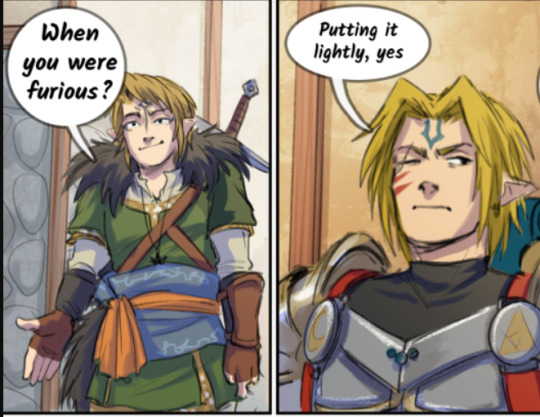
Twilight being cheeky and Time's dad face are giving me life.
But... as we know, Time is Twilights direct decendant only by a few generations at most. With the infomation we have from Twilight princess with Shade. And from jojo with Time and Twilight. I'm seeing this conversation as more of a father and son conversation over brothers.
And the rest of this conversation follows this same pattern. Twilight is very much being scolded. He's biting back with what he see's as Time's own words. (not that time know's as such)
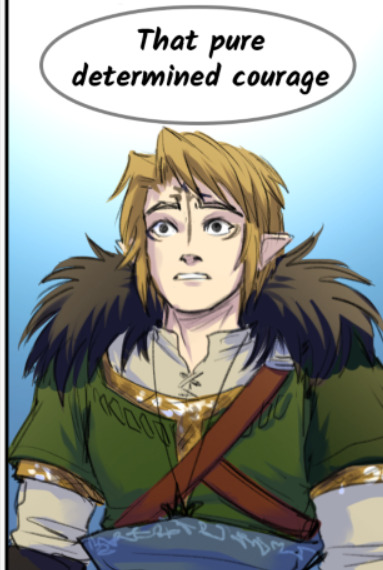
Twilight looks genuenly shocked to hear this.
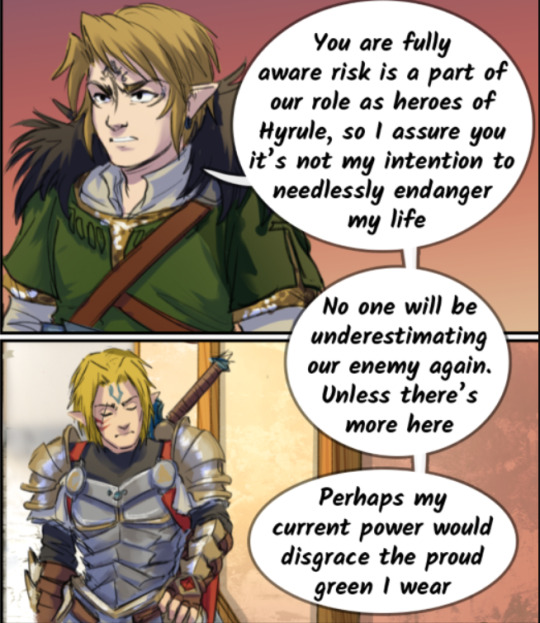
From the hero's shade (Time) in twilight princess.
"You may be destined to become the hero of legend...but your current power would disgrace the proud green of the hero's tunic you wear. "
I am screaming
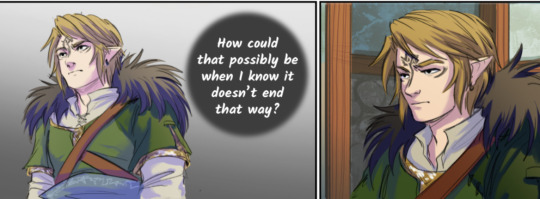
And now im screaming more. Twilight nooooooooooooo
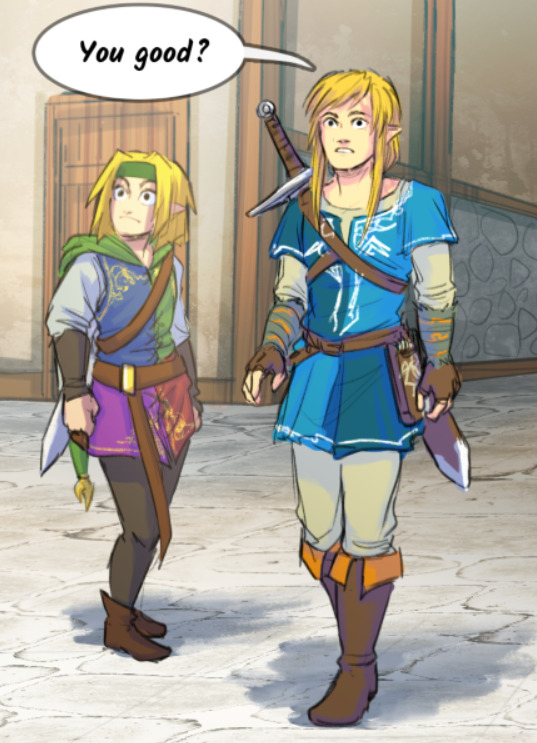
The we care about Twilight's well being gang. Spoiling us with the full body shots againnnnnnn.
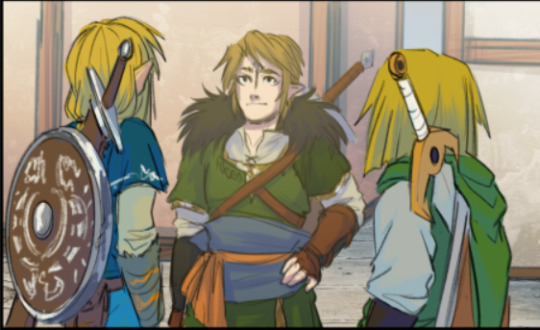
Give me more of these three i love them all together.

And I'm convinced that theres going to be something bad happens to time directly after the end of the LU timeline.
Time is missing an eye. So we know that Shade and Time are closer together than the hero of time (In game). SO.... If time dosent Die on the adventure with the chain. I'm almost convinced he does almost right after he returns back to his time.
The armour is almost identical. He has most of the scaring which lines up....
If the helmet turns up, then i think Time dies during this adventure. It's the only thing i can see as missing.
Twilight.... Now i think Twilight thinks that the gods are giving him an opportunity to save the hero of time from dying to become the heros shade. but thats the funky thing about timetravel.
(Depending on how Jojo and LU time travels works.)
I believe that the timetravel in LU solidifies the adventures of the other links. And that nothign that occours in this adventure impacts their adventures. Even if something was changed it wouldnt change the past.
IE - Twilight breaking his shadow crystal wouldnt mean that wild didnt remember having the wolf on his adventure - as its already happened.
(I hope that makes sense. - time travel is confusing i see it as an alternative timeline type thing)
Moving on!

Wild is best brother 101
Also twilight getting flustered about a girl oh bless this man i low key love him okay

Her!
Also

Smiley man

Epona is a wonderful girl and i love her so much okay
Also Warriors!
HE LOOKS SO HAPPY AGAIN
Man got his emotional support scarf and is no longer stressed (Atleast not visably)
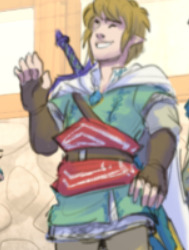
HE!
BELOVED AGAIN HE IS SO HAPPY I AM NORMAL ABOUT THIS MAN
okay

Please understand how much i am cackling at the shenanigans of these three.
Wind rolling around because it is clearly faster mode of travel
Go zoomies wind go zoomies!
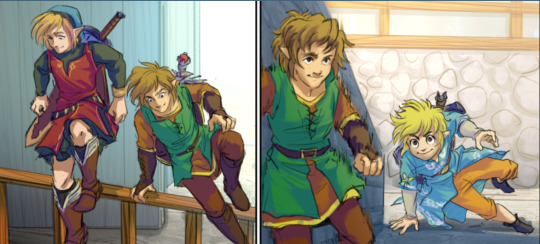
Wind rolled down the stairs you cant convince me otherwise. Look at his little superhero pose as hes moving around the corner.
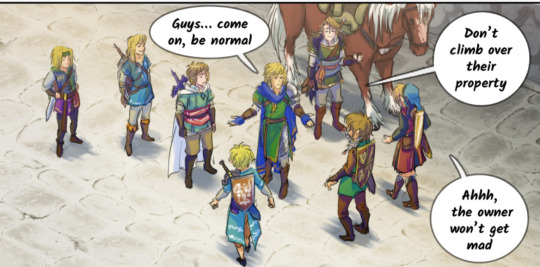
Older brother alert, dont ruin the kids fun warriors they are just getting excited about being on the road again.
Also Warriors, This is normal link behaviour. Just ask Time. He would eailsy tell you that he rolled around hyrule field.

I LOVE HIS LITTLE FACE OKAY
MY BELOVED BLORBO 🧍
(if i run out of pictures i swear to hylia)
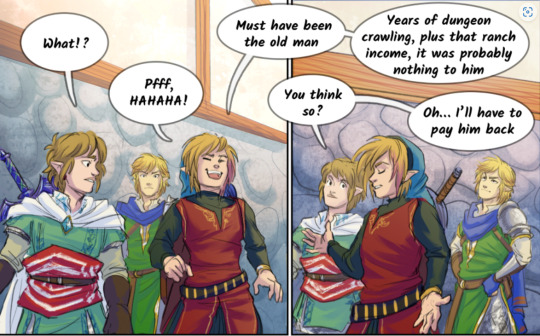
There's so much brotherly energy in these panels i love them all so much okay.
Also Sky offering to Pay Time back for the Inn Fee this is why i love the wonderful blorbo okay
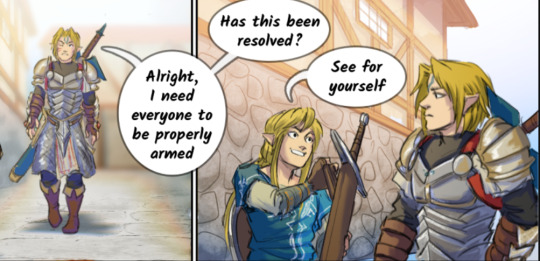
Guys im sorry, he's their dad. You cant change my mind.
Thats a dad walk, with a dad sentence.
'Okay guys i need to make sure you are not gonna get killed please have swords.'

The blacksmithing gang getting the love they deserve.

Sky leading the charge! (I know its cause he knows the way and stuff But...)
It also makes a lot of sense. If Sky is the slowest of the group(Again not confirmed but we have had jokes about his stamina), it makes sense to put him at the front to maintain pace of the group. Stops people going too fast and prevents people from being left behind.
Which i might add has already happened. (Warriors and Hyrule im looking at you.)
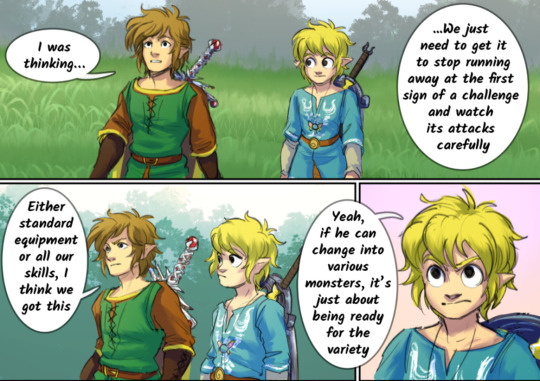
We just need to read the boss partterns for a bit so we can then decide how to fight it. You know, like we did when we were in our adventures and had to figure out boss mechanics.
Important that hyrule is saying this as his game is arguably one of the hardest. He probably spent a long time on each boss learning attack patterns.
Oh this arc was fun! So much fun i love it so much okay
Thank you so much again for hanging out with me while i write these. I love making them and i really appreciate all the support on them. (If you could share it around i'd really appreciate it :) )
Have a wonderful day! :D
#linked universe#linkeduniverse#lu update time#comic analysis with major#lu update spoilers#corner of lu updates#lu spoilers#dawn 9#ramble corner with major#lu sky#lu four#lu twilight#lu time#lu legend#lu chain#lu hyrule#lu warriors#lu wind#lu wild#i love making these sm#major once again pusher her Sky blorbo propoganda#you are all welcome#:)#4 hour deep dive once again
149 notes
·
View notes
Text
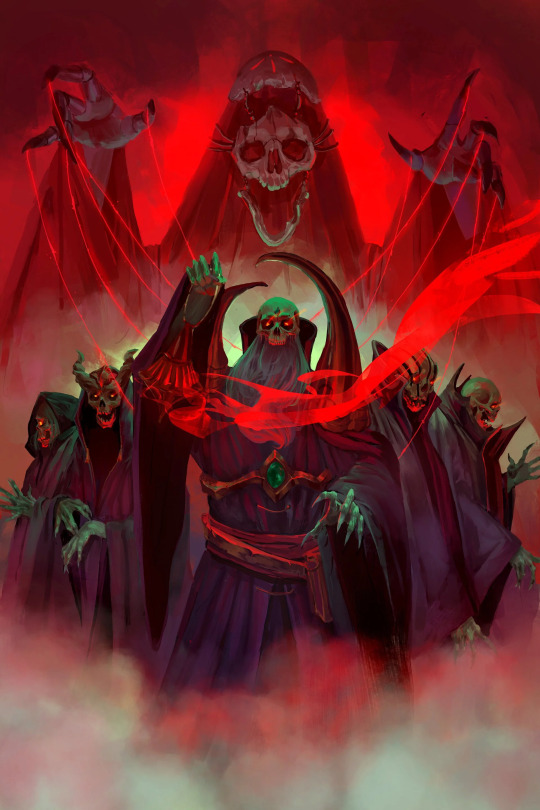
Villain: The Hollow Lords
Though their reign was long thought ended, this circle of skeletal tyrants have returned from the dark depths of history to conquer the ream once again. Their awakening heralded by a tide of destruction and plague meant to destabilize the land and seed it with corpses to make up their army of undead.
Something is wrong with this story though, details that don't match up, an unknown will at work behind the actions of the lifeless villains. Whatever threat they may pose, an even greater danger pulls the strings of the hollow lords, a danger the party will confront all too soon.
Adventure Hooks:
Before they awaken, the hollow lords should be woven into the campaign as an innocuous background detail, a threat from a previous millennium which defined the heroes of that era. Forgotten today outside of festival traditions, old monuments, and the standing alliances between kingdoms, This sets a standard against which the party can measure themselves.
Scenario A sees the Hollow Lords emerging in the party's own realm, a wave of inexplicable disasters paving the way for the rise of an emerging threat just in time for our heroes to enter a new adventuring tier. In this instance it's about preventing the disasters from spreading/ the undead from establishing their foothold across a land the party has just finished journeying across. Our heroes will be stretched thin, People they know are going to suffer, and deliberate choices will need to be made about what they can save. Looking into the history of the lords only raises more questions, namely that many of them emerged from graves belonging to people who were born and died centuries after the original Hollow Lords were vanquished.
Scenario B has the Hollow Lords as an established threat, ruling over a Mordor like kingdom of darkness either bordering the party's own homeland, or being the party's own homeland if you want to get bleak about it. After our heroes defeat their first of the villains they receive a strange invitation, another of the Hollow Lords has broken partially free of whatever enchantment binds them and is pleading for help. If the party are willing to take a gamble, this rogue undead is willing to use all its dread power to aid them if they can figure out a way to put it to rest for good.
Though each was mighty or powerful in their own right, there was no unholy conspiracy that connected the Hollow Lords during their living years, at-least not on their part. Instead they were all called back to the mortal plane by a veiled necromancer who had some invisible claim on their soul. Stripped of their will, they were forced to act on behalf of this faceless puppeteer, allowing whoever it was beneath the skullmask and robe to carve out a kingdom while remaining in the shadows. Most troubling of all, those one or two Hollow Lords that were around for their first attempt at world domination also remember the veiled necromancer, speaking of a conspiracy centuries in the making.
Artist
#undead#villain#villain undead#darklord#mid level#disaster#warlock#villain warlock#high level#dnd#dungeons and dragons#d&d#ttprg#pathfinder
207 notes
·
View notes
Text
There’s something uniquely haunting about the words ‘one brings shadow, one brings light’ and how many different things they mean over the course of the story.
At the start of A Realm Reborn, the hero takes on the name of the Warrior of Light, and nothing could be more fitting. They are the champion of justice, someone who fights to bring peace to a war-torn, despairing world. It is a symbolism that resonates naturally and easily with the audience: the Warrior of Light lifts the shadow of the Empire, and lets people look forward to new beginnings, turn to a new dawn with the coming of the Astral Era. (As we eventually learn from Moren, the name was originally born of that symbolism: from people finding hope in their heroes, and giving them a name expressive of that hope.)
And then we meet the Warriors of Darkness: at first glance, they are obvious villains, seeking to undo the Warrior of Light’s work and drown the Source in darkness and fear. Their name evokes skullduggery and mystique, and it is a haunting inversion of the Warrior of Light’s, suggesting that they are bound to be our foes.
And then we learn the truth of their origins: they were Warriors of Light, just like us, and their path, so like ours, brought ruin upon their world. We learn, for the first time, that the Light is a force to be reckoned with and feared, and that Light and Dark are not so different after all.
When we finally get to the First, the inversion comes full circle. We meet Ardbert as the Warrior of Light, and our WoL is now the fabled Warrior of Darkness: the bringer of night and reprieve to a world that has known no rest from fear and striving. The term ’Warrior of Light’ is no longer a symbol of adulation, but one of reprobation and reproach.
The duality of shadow and light is also exemplified by Emet-Selch and the Crystal Exarch. The Exarch turns to the future with hope, while Emet-Selch lives in the past, with the shades of memory. The Exarch seeks to protect Hydaelyn’s will, and avert the return of Zodiark. Emet-Selch slinks and prowls on the margins of history, weaving malign and intricate plots, sowing discord and fear and doubt. The Exarch stands at the forefront of history, facing down corruption and chaos, making his city a bastion of resistance and rallying everyone beneath the cause of hope. Emet-Selch represents the shadow of conquest and imperialism over the land; the Exarch has built a city of kindness, fellowship and egalitarianism.
And yet, even here, the symbolism is inverted, for the hope the Exarch brings is in the shape of the gentle night, while Emet-Selch seeks to drown the world in searing light. In the bright open spaces of the Crystarium, it is only the Exarch who walks in shadow. He deals in secrets, hiding his plans and his face and his name, while Emet-Selch seeks to understand, and bestows terrible knowledge. The light of the Exarch’s plan is perfect and pitiless, and it is up to Emet-Selch’s prowlings and plottings to save him, gun in villainous hand.
And the most fundamental form of the inversion is learning that Emet-Selch is, in a way, fighting for the same thing as the Warrior of Light is: he is fighting to save his world and his people, and to him we are the villains.
The light of the Warriors’ hope and belief breaks through the miasma of Hades’ terror and grief. And at the end, Emet-Selch stands there, ragged light spilling out of the hole in his body, and smiles, in a final gesture of acknowledgement. He dissolves into a shower of gentle light, spilling over the Warrior of Light like a benediction.
Everything is inverted in the First: people glory in the name of sinners, shudder at forgiveness, and celebrate the night. The sin eaters are bright and beautiful and gentle, and they bring a terrible, merciless forgiveness: a forgiveness that tears you apart from the inside; a forgiveness that blankets the world in silence and inexorable light.
The first time we hear the iconic line ’one brings shadow, one brings light’ is in the scene where the Warriors of Light and Darkness merge into one—the Warrior of Light helping to contain the light raging within the Warrior of Darkness, their souls embracing in understanding and warmth. It is a moment of glorious illumination: of the twin Warriors understanding their connection, and of Ardbert seeing his purpose, the clear resonant notes of the theme song ringing out in glorious triumph. But it is also a moment of gentleness and reprieve. The light is no longer spilling out of the Warrior of Light’s wounded soul; Ardbert is there, providing them with sanctuary, with gentle shade. The Warrior of Light does not have to be fight their battle alone and unflinching. They do not have to be perfect any more, for there is someone to watch their back.
They are truly two-toned echoes tumbling through time: Ardbert retraced the Warrior of Light’s path on the First, and now they have retraced his.
The symbolism of light and dark is most starkly exemplified by Hydaelyn and Zodiark—Zodiark as the will of the star back to the past, to the splendour and sorrow and hubris of Amaurot; Hydaelyn as the will of the star towards light and growth and change. But now it is Hydaelyn who reigns, and defends herself against Zodiark’s incursion. She is no longer the disruptor, but the preserver of the status quo, of the lives that already exist. On the First, Light brings stasis and silence and emptiness.
We revisit this symbolism with Elidibus in The Seat of Symbolism: the heart of Zodiark, taking on the person of the Warrior of Light, and fighting off Hydaelyn’s champion, who bears the mantle of a Warrior of Darkness. Elidibus is lost in grief and darkness and doubt; he fears loss, and he does not remember. He must fight to save his doomed cause, though he does not know why. The Crystal Exarch and the Warrior of Darkness bring him light, in the shape of remembering, and of absolution. Now he remembers the comrades he fought for, and the love that drove him; he does not have to struggle on in the darkness any more.
In the Eden storyline, the symbolism of shadow and light is evoked by Ryne and Gaia, the Oracles of Light and Darkness. Mitron seeks to keep Gaia in the shadows, taking her memories, wresting away her agency over her life. Ryne brings her light, in a symbolic sense, helping her discover who she is and what she wants, offering her warmth and comfort and hope. But it is simultaneously Gaia’s darkness that helps them break the light’s chokehold and return life and growth to the world. It is the hammer of her darkness that breaks through the light’s overwhelming hold on Ryne, quite literally saving both her and the world. And in the end, she makes the powerful choice not to know of her past in Eulmore, preferring to turn her gaze to the future. Her story encapsulates a central theme of the Eden arc: escaping stasis, embracing change and growth, making new memories.
In Shadowbringers, right and wrong are not inexorable absolutes that we are to be judged by. Light and Darkness are two-toned echoes tumbling through time: humanity and the dragons, the Warriors of Light and Darkness, the champions of Zodiark and Hydaelyn. We should not be too quick to form our judgements, for nothing is as it seems, and there is hope to be found in the night.
#ffxiv#final fantasy xiv#ffxiv meta#shadowbringers#shadowbringers spoilers#crystal exarch#g'raha tia#emet-selch#ardbert hylfyst#ryne waters#gaia ffxiv#rynegaia#my post
248 notes
·
View notes
Text
In 2006, the year Taylor Swift released her first single, a closeted country singer named Chely Wright, then 35, held a 9-millimeter pistol to her mouth. Queer identity was still taboo enough in mainstream America that speaking about her love for another woman would have spelled the end of a country music career. But in suppressing her identity, Ms. Wright had risked her life.
In 2010, she came out to the public, releasing a confessional memoir, “Like Me,” in which she wrote that country music was characterized by culturally enforced closeting, where queer stars would be seen as unworthy of investment unless they lied about their lives. “Country music,” she wrote, “is like the military — don’t ask, don’t tell.”
The culture in which Ms. Wright picked up that gun — the same one in which Ms. Swift first became a star — was stunningly different from today’s. It’s dizzying to think about the strides that have been made in Americans’ acceptance of the L.G.B.T.Q. community over the past decade: marriage equality, queer themes dominating teen entertainment, anti-discrimination laws in housing and, for now, in the workplace. But in recent years, a steady drip of now-out stars — Cara Delevingne, Colton Haynes, Elliot Page, Kristen Stewart, Raven-Symoné and Sam Smith among them — have disclosed that they had been encouraged to suppress their queerness in order to market projects or remain bankable.
The culture of country music hasn’t changed so much that homophobia is gone. Just this past summer, Adam Mac, an openly gay country artist, was shamed out of playing at a festival in his hometown because of his sexual orientation. In September, the singer Maren Morris stepped away from country music; she said she did so in part because of the industry’s lingering anti-queerness. If country music hasn’t changed enough, what’s to say that the larger entertainment industry — and, by extension, our broader culture — has?
Periodically, I return to a video, recorded by a shaky hand more than a decade ago, of Ms. Wright answering questions at a Borders bookstore about her coming out. She likens closeted stardom to a blender, an “insane” and “inhumane” heteronormative machine in which queer artists are chewed to bits.
“It’s going to keep going,” Ms. Wright says, “until someone who has something to lose stands up and just says ‘I’m gay.’ Somebody big.” She continues: “We need our heroes.”
What if someone had already tried, at least once, to change the culture by becoming such a hero? What if, because our culture had yet to come to terms with homophobia, it wasn’t ready for her?
What if that hero’s name was Taylor Alison Swift?
In the world of Taylor Swift, the start of a new “era” means the release of new art (an album and the paratexts — music videos, promotional ephemera, narratives — that supplement it) and a wholesale remaking of the aesthetics that will accompany its promotion, release and memorializing. In recent years, Ms. Swift has dominated pop culture to such a degree that these transformations often end up altering American culture in the process.
In 2019, she was set to release a new album, “Lover,” the first since she left Big Machine Records, her old Nashville-based label, which she has since said limited her creative freedom. The aesthetic of what would be known as the “Lover Era” emerged as rainbows, butterflies and pastel shades of blue, purple and pink, colors that subtly evoke the bisexual pride flag.
On April 26, Lesbian Visibility Day, Ms. Swift released the album’s lead single, “ME!,” in which she sings about self-love and self-acceptance. She co-directed a campy music video to accompany it, which she would later describe as depicting “everything that makes me, me.” It features Ms. Swift dancing at a pride parade, dripping in rainbow paint and turning down a man’s marriage proposal in exchange for a … pussy cat.
At the end of June, the L.G.B.T.Q. community would celebrate the 50th anniversary of the Stonewall Riots. On June 14, Ms. Swift released the video for her attempt at a pride anthem, “You Need to Calm Down,” in which she and an army of queer celebrities from across generations — the “Queer Eye” hosts, Ellen DeGeneres, Billy Porter, Hayley Kiyoko, to name a few — resist homophobia by living openly. Ms. Swift sings that outrage against queer visibility is a waste of time and energy: “Why are you mad, when you could be GLAAD?”
The video ends with a plea: “Let’s show our pride by demanding that, on a national level, our laws truly treat all of our citizens equally.” Many, in the press and otherwise, saw the video as, at best, a misguided attempt at allyship and, at worst, a straight woman co-opting queer aesthetics and narratives to promote a commercial product.
Then, Ms. Swift performed “Shake It Off” as a surprise for patrons at the Stonewall Inn. Rumors — that were, perhaps, little more than fantasies — swirled in the queerer corners of her fandom, stoked by a suggestive post by the fashion designer Christian Siriano. Would Ms. Swift attend New York City’s WorldPride march on June 30? Would she wear a dress spun from a rainbow? Would she give a speech? If she did, what would she declare about herself?
The Sunday of the march, those fantasies stopped. She announced that the music executive Scooter Braun, who she described as an “incessant, manipulative” bully, had purchased her masters, the lucrative original recordings of her work.
Ms. Swift’s “Lover” was the first record that she created with nearly unchecked creative freedom. Lacking her old label’s constraints, she specifically chose to feature activism for and the aesthetics of the L.G.B.T.Q. community in her confessional, self-expressive art. Even before the sale of her masters, she appeared to be stepping into a new identity — not just an aesthetic — that was distinct from that associated with her past six albums.
When looking back on the artifacts of the months before that album’s release, any close reader of Ms. Swift has a choice. We can consider the album’s aesthetics and activism as performative allyship, as they were largely considered to be at the time. Or we can ask a question, knowing full well that we may never learn the answer: What if the “Lover Era” was merely Ms. Swift’s attempt to douse her work — and herself — in rainbows, as so many baby queers feel compelled to do as they come out to the world?
There’s no way of knowing what could have happened if Ms. Swift’s masters hadn’t been sold. All we know is what happened next. In early August, Ms. Swift posted a rainbow-glazed photo of a series of friendship bracelets, one of which says “PROUD” with beads in the color of the bisexual pride flag. Queer people recognize that this word, deployed this way, typically means that someone is proud of their own identity. But the public did not widely view this as Ms. Swift’s coming out.
Then, Vogue released an interview with Ms. Swift that had been conducted in early June. When discussing her motivations for releasing “You Need to Calm Down,” Ms. Swift said, “Rights are being stripped from basically everyone who isn’t a straight white cisgender male.” She continued: “I didn’t realize until recently that I could advocate for a community that I’m not a part of.” That statement suggests that Ms. Swift did not, in early June, consider herself part of the L.G.B.T.Q. community; it does not illuminate whether that is because she was a straight, cis ally or because she was stuck in the shadowy, solitary recesses of the closet.
On Aug. 22, Ms. Swift publicly committed herself to the as-of-then-unproven project of rerecording and rereleasing her first six albums. The next day, she finally released “Lover,” which raises more questions than it answers. Why does she have to keep secrets just to keep her muse, as all her fans still sing-scream on “Cruel Summer”? About what are the “hundred thrown-out speeches I almost said to you,” in her chronicle of self-doubt, “The Archer,” if not her identity? And what could the album’s closing words, which come at the conclusion of “Daylight,” a song about stepping out of a 20-year darkness and choosing to “let it go,” possibly signal?
I want to be defined by the things that I love,
Not the things I hate,
Not the things that I’m afraid of, I’m afraid of,
Not the things that haunt me in the middle of the night,
I just think that,
You are what you love.
The first time I viewed “Lover” through the prism of queerness, I felt delirious, almost insane. I kept wondering whether what I was perceiving in her work was truly there or if it was merely a mirage, born of earnest projection.
My longtime reading of Ms. Swift’s celebrity — like that of a majority of her fan base — had been stuck in the lingering assumptions left by a period that began more than a decade and a half ago, when a girl with an overexaggerated twang, Shirley Temple curls and Georgia stars in her eyes became famous. Then, she presented as all that was to be expected of a young starlet: attractive yet virginal, knowing yet naïve, not talented enough to be formidable, not commanding enough to be threatening, confessional, eager to please. Her songs earnestly depicted the fantasies of a girl raised in a traditional culture: high school crushes and backwoods drives, princelings and wedding rings, declarations of love that climax only in a kiss — ideally in the pouring rain.
When Ms. Swift was trying to sell albums in that late-2000s media environment, her songwriting didn’t match the image of a sex object, the usual role reserved for female celebrities in our culture. Instead, the story the public told about her was that she laundered her affection to a litter of promising grown men, in exchange for songwriting inspiration. A young Ms. Swift contributed to this narrative by hiding easy-to-decode clues in liner notes that suggested a certain someone was her songs’ inspiration (“SAM SAM SAM SAM SAM SAM,” “ADAM,” “TAY”) or calling out an ex-boyfriend on the “Ellen” show and “Saturday Night Live.” Despite the expansive storytelling in Ms. Swift’s early records, her public image often cast a man’s interest as her greatest ambition.
As Ms. Swift’s career progressed, she began to remake that image: changing her style and presentation, leaving country music for pop and moving from Nashville to New York. By 2019, her celebrity no longer reflected traditional culture; it had instead become a girlboss-y mirror for another dominant culture — that of white, cosmopolitan, neoliberal America.
But in every incarnation, the public has largely seen those songs — especially those for which she doesn’t directly state her inspiration — as cantos about her most recent heterosexual love, whether that idea is substantiated by evidence or not. A large portion of her base still relishes debating what might have happened with the gentleman caller who supposedly inspired her latest album. Feverish discussions of her escapades with the latest yassified London Boy or mustachioed Mr. Americana fuel the tabloid press — and, embarrassingly, much of traditional media — that courts fan engagement by relentlessly, unquestioningly chronicling Ms. Swift’s love life.
Even in 2023, public discussion about the romantic entanglements of Ms. Swift, 34, presumes that the right man will “finally” mean the end of her persistent husbandlessness and childlessness. Whatever you make of Ms. Swift’s extracurricular activities involving a certain football star (romance for the ages? strategic brand partnership? performance art for entertainment’s sake?), the public’s obsession with the relationship has been attention-grabbing, if not lucrative, for all parties, while reinforcing a story that America has long loved to tell about Ms. Swift, and by extension, itself.
Because Ms. Swift hasn’t undeniably subverted our culture’s traditional expectations, she has managed, in an increasingly fractured cultural environment, to simultaneously capture two dominant cultures — traditional and cosmopolitan. To maintain the stranglehold she has on pop culture, Ms. Swift must continue to tell a story that those audiences expect to consume; she falls in love with a man or she gets revenge. As a result, her confessional songs languish in a place of presumed stasis; even as their meaning has grown deeper and their craft more intricate, a substantial portion of her audience’s understanding of them remains wedded to the same old narratives.
But if interpretations of Ms. Swift’s art often languish in stasis, so do the millions upon millions of people who love to play with the dollhouse she has constructed for them. Her dominance in pop culture and the success of her business have given her the rare ability to influence not only her industry but also the worldview of a substantial portion of America. How might her industry, our culture and we, ourselves, change if we made space for Ms. Swift to burn that dollhouse to the ground?
Anyone considering the whole of Ms. Swift’s artistry — the way that her brilliantly calculated celebrity mixes with her soul-baring art — can find discrepancies between the story that underpins her celebrity and the one captured by her songs. One such gap can be found in her “Lover” era. Others appear alongside “dropped hairpins,” or the covert ways someone can signal queer identity to those in the know while leaving others comfortable in their ignorance. Ms. Swift dropped hairpins before “Lover” and has continued to do so since.
Sometimes, Ms. Swift communicates through explicit sartorial choices — hair the colors of the bisexual pride flag or a recurring motif of rainbow dresses. She frequently depicts herself as trapped in glass closets or, well, in regular closets. She drops hairpins on tour as well, paying tribute to the Serpentine Dance of the lesbian artist Loie Fuller during the Reputation Tour or referencing “The Ladder,” one of the earliest lesbian publications in the United States, in her Eras Tour visuals.
During the Eras Tour, Ms. Swift traps her past selves — including those from her “Lover” era — in glass closets.
Dropped hairpins also appear in Ms. Swift’s songwriting. Sometimes, the description of a muse — the subject of her song, or to whom she sings — seems to fit only a woman, as it does in “It’s Nice to Have a Friend,” “Maroon” or “Hits Different.” Sometimes she suggests a female muse through unfulfilled rhyme schemes, as she does in “The Very First Night,” when she sings “didn’t read the note on the Polaroid picture / they don’t know how much I miss you” (“her,” instead of that pesky little “you,” would rhyme). Her songwriting also noticeably alludes to poets whose muses the historical record incorrectly cast as men — Emily Dickinson chief among them — as if to suggest the same fate awaits her art. Stunningly, she even explicitly refers to dropping hairpins, not once, but twice, on two separate albums.
In isolation, a single dropped hairpin is perhaps meaningless or accidental, but considered together, they’re the unfurling of a ballerina bun after a long performance. Those dropped hairpins began to appear in Ms. Swift’s artistry long before queer identity was undeniably marketable to mainstream America. They suggest to queer people that she is one of us. They also suggest that her art may be far more complex than the eclipsing nature of her celebrity may allow, even now.
Since at least her “Lover” era, Ms. Swift has explicitly encouraged her fans to read into the coded messages (which she calls “Easter eggs”) she leaves in music videos, social media posts and interviews with traditional media outlets, but a majority of those fans largely ignore or discount the dropped hairpins that might hint at queer identity. For them, acknowledging even the possibility that Ms. Swift could be queer would irrevocably alter the way they connect with her celebrity, the true product they’re consuming.
There is such public devotion to the traditional narrative Ms. Swift embodies because American culture enshrines male power. In her sweeping essay, “Compulsory Heterosexuality and Lesbian Existence,” the lesbian feminist poet Adrienne Rich identified the way that male power cramps, hinders or devalues women’s creativity. All of the sexist undertones with which Ms. Swift’s work can be discussed (often, even, by fans) flow from compulsory heterosexuality, or the way patriarchy draws power from the presumption that women naturally desire men. She must write about men she surely loves or be unbankable; she must marry and bear children or remain a child herself; she must look like, in her words, a “sexy baby” or be undesirable, “a monster on the hill.”
A woman who loves women is most certainly a monster to a society that prizes male power. She can fulfill none of the functions that a traditional culture imagines — wife, mother, maid, mistress, whore — so she has few places in the historical record. The Sapphic possibility of her work is ignored, censored or lost to time. If there is queerness earnestly implied in Ms. Swift’s work, then it’s no wonder that it, like that of so many other artists before her, is so often rendered invisible in the public imagination.
While Ms. Swift’s songs, largely written from her own perspective, cannot always conform to the idea of a woman our culture expects, her celebrity can. That separation, between Swift the songwriter and Swift the star, allows Ms. Swift to press against the golden birdcage in which she has found herself. She can write about women’s complexity in her confessional songs, but if ever she chooses not to publicly comply with the dominant culture’s fantasy, she will remain uncategorizable, and therefore, unsellable.
Her star — as bright as it is now — would surely dim.
Whether she is conscious of it or not, Ms. Swift signals to queer people — in the language we use to communicate with one another — that she has some affinity for queer identity. There are some queer people who would say that through this sort of signaling, she has already come out, at least to us. But what about coming out in a language the rest of the public will understand?
The difference between any person coming out and a celebrity doing so is the difference between a toy mallet and a sledgehammer. It’s reasonable for celebrities to be reticent; by coming out, they potentially invite death threats, a dogged tabloid press that will track their lovers instead of their beards, the excavation of their past lives, a torrent of public criticism and the implosion of their careers. In a culture of compulsory heterosexuality, to stop lying — by omission or otherwise — is to risk everything.
American culture still expects that stars are cis and straight until they confess themselves guilty. So, when our culture imagines a celebrity’s coming out, it expects an Ellen-style announcement that will submerge the past life in phoenix fire and rebirth the celebrity in a new image. In an ideal culture, wearing a bracelet that says “PROUD,” waving a pride flag onstage, placing a rainbow in album artwork or suggestively answering fan questions on Instagram would be enough. But our current reality expects a supernova.
Because of that expectation, stars end up trapped behind glass, which is reinforced by the tabloid press’s subtle social control. That press shapes the public’s expectations of others’ identities, even when those identities are chasms away from reality. Celebrities who master this press environment — Ms. Swift included — can bolster their business, but in doing so, they reinforce a heteronormative culture that obsesses over pregnancy, women’s bodies and their relationships with men.
That environment is at odds with the American movement for L.G.B.T.Q. equality, which still has fights to win — most pressingly, enshrining trans rights and squashing nonsensical culture wars. But lately I’ve heard many of my young queer contemporaries — and the occasional star — wonder whether the movement has come far enough to dispense with the often messy, often uncomfortable process of coming out, over and over again.
That questioning speaks to an earnest conundrum that queer people confront regularly: Do we live in this world, or the world to which we ought to aspire?
Living in aspiration means ignoring the convention of coming out in favor of just … existing. This is easier for those who can pass as cis and straight if need be, those who are so wealthy or white that the burden of hiding falls to others and those who live in accepting urban enclaves. This is a queer life without friction; coming out in a way straight people can see is no longer a prerequisite for acceptance, fulfillment and equality.
This aspiration is tremendous, but in our current culture, it is available only to a privileged few. Should such an inequality of access to aspiration become the accepted state of affairs, it would leave those who can’t hide to face society’s cruelest actors without the backing of a vocal, activated community. So every queer person who takes issue with the idea that we must come out ought to ask a simple question — what do we owe one another?
If coming out is primarily supposed to be an act of self-actualization, to form our own identities, then we owe one another nothing. This posture recognizes that the act of coming out implicitly reinforces straight and cis identities as default, which is not worth the rewards of outness.
But if coming out is supposed to be a radical act of resistance that seeks to change the way our society imagines people to be, then undeniable visibility is essential to make space for those without power. In this posture, queer people who can live in aspiration owe those who cannot a real world in which our expansive views of love and gender aren’t merely tolerated but celebrated. We have no choice but to actively, vocally press against the world we’re in, until no one is stuck in it.
And so just for a little while longer, we need our heroes.
But if queer people spend all of our time holding out for a guiding light, we might forgo a more pressing question that if answered, just might inch all of us a bit closer to aspiration. The next time heroes appear, are we ready to receive them?
It takes neither a genius nor a radical to see queerness implied by Ms. Swift’s work. But figuring out how to talk about it before the star labels herself is another matter. Right now, those who do so must inject our perceptions with caveats and doubt or pretend we cannot see it (a lie!) — implicitly acquiescing to convention’s constraints in the name of solidarity.
Lying is familiar to queer people; we teach ourselves to do it from an early age, shrouding our identities from others, and ourselves. It’s not without good reason. To maintain the safety (and sometimes the comfort) of the closet, we lie to others, and, most crucially, we allow others to believe lies about us, seeing us as something other than ourselves. Lying is doubly familiar to those of us who are women. To reduce friction, so many of us still shrink life to its barest version in the name of honor or safety, rendering our lives incomplete, our minds lobotomized and our identities unexplored.
By maintaining a culture of lying about what we, uniquely, have the knowledge and experience to see, we commit ourselves to a vow of silence. That vow may protect someone’s safety, but when it is applied to works of culture, it stymies our ability to receive art that has the potential to change or disrupt us. As those with queer identity amass the power of commonplaceness, it’s worth questioning whether the purpose of one of the last great taboos that constrains us befits its cost.
In every case, is the best form of solidarity still silence?
I know that discussing the potential of a star’s queerness before a formal declaration of identity feels, to some, too salacious and gossip-fueled to be worthy of discussion. They might point to the viciousness of the discourse around “queerbaiting” (in which I have participated); to the harm caused by the tabloid press’s dalliances with outing; and, most crucially, to the real material sacrifices that queer stars make to come out, again and again, as reasons to stay silent.
I share many of these reservations. But the stories that dominate our collective imagination shape what our culture permits artists and their audiences to say and be. Every time an artist signals queerness and that transmission falls on deaf ears, that signal dies. Recognizing the possibility of queerness — while being conscious of the difference between possibility and certainty — keeps that signal alive.
So, whatever you make of Ms. Swift’s sexual orientation or gender identity (something that is knowable, perhaps, only to her) or the exact identity of her muses (something better left a mystery), choosing to acknowledge the Sapphic possibility of her work has the potential to cut an audience that is too often constrained by history, expectation and capital loose from the burdens of our culture.
To start, consider what Ms. Swift wrote in the liner notes of her 2017 album, “reputation”: “When this album comes out, gossip blogs will scour the lyrics for the men they can attribute to each song, as if the inspiration for music is as simple and basic as a paternity test.”
Listen to her. At the very least, resist the urge to assume that when Ms. Swift calls the object of her affection “you” in a song, she’s talking about a man with whom she’s been photographed. Just that simple choice opens up a world of Swiftian wordplay. She often plays with pronouns, trading “you” and “him” so that only someone looking for a distinction between two characters might find one. Turns of phrase often contain double or even triple meanings. Her work is a feast laid specifically for the close listener.
Choosing to read closely can also train the mind to resist the image of an unmarried woman that compulsory heterosexuality expects. And even if it is only her audience who points at rainbows, reading Ms. Swift’s work as queer is still worthwhile, for it undermines the assumption that queer identity impedes pop superstardom, paving the way for an out artist to have the success Ms. Swift has.
After all, would it truly be better to wait to talk about any of this for 50, 60, 70 years, until Ms. Swift whispers her life story to a biographer? Or for a century or more, when Ms. Swift’s grandniece donates her diaries to some academic library, for scholars to pore over? To ensure that mea culpas come only when Ms. Swift’s bones have turned to dust and fragments of her songs float away on memory’s summer breeze?
I think not. And so, I must say, as loudly as I can, “I can see you,” even if I risk foolishness for doing so.
I remember the first time I knew I had seen Taylor Alison Swift break free from the trap of stardom. I wasn’t sitting in a crowded stadium in the pouring rain or cuddled up in a movie theater with a bag of popcorn. I was watching a grainy, crackling livestream of the Eras Tour, captured on a fan’s phone.
It’s late at night, the beginning of her acoustic set of surprise songs, this time performed in a yellow dress. She begins playing “Hits Different.” It’s a new song, full of puns, double entendres and wordplay, that toys with the glittering identities in which Ms. Swift indulges.
She’s rushing, as if stopping, even for a second, will cause her to lose her nerve. She stumbles at the bridge, pauses and starts again; the queen of bridges will not mess this up, not tonight.
There it is, at the bridge’s end: “Bet I could still melt your world; argumentative, antithetical dream girl.” An undeniable declaration of love to a woman. As soon as those words leave her lips, she lets out a whoop, pacing around the stage with a grin that cannot be contained.
For a moment, Ms. Swift was out of the woods she had created for herself as a teenager, floating above the trees. The future was within reach; she would, and will, soon take back the rest of her words, her reputation, her name. Maybe the world would see her, maybe it wouldn’t.
But on that stage, she found herself. I was there. Through a fuzzy fancam, I saw it.
And somehow, that was everything.
#ooooh my word this was BREATHTAKING and so well-said#because coming out is in fact a very delicate thing#full article here for the tumblr crowd!#taylor swift#articles#new york times#gaylor swift#gaylor#lover#chely wright
228 notes
·
View notes